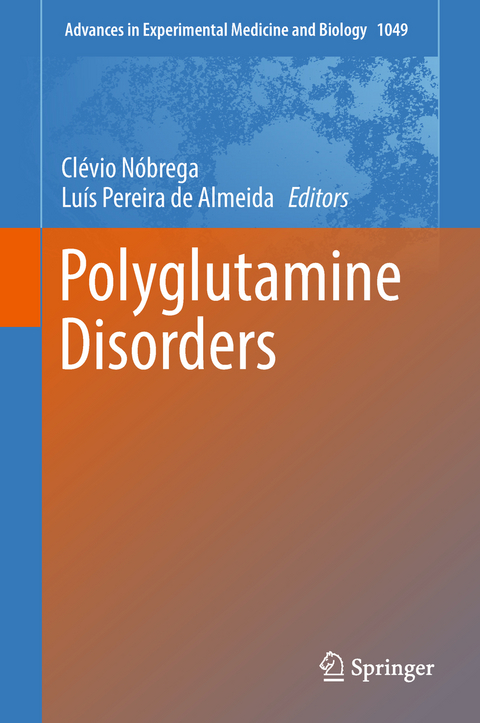
Polyglutamine Disorders
Springer International Publishing (Verlag)
978-3-319-71778-4 (ISBN)
This book provides a cutting-edge review of polyglutamine disorders. It primarily focuses on two main aspects: (1) the mechanisms underlying the pathologies' development and progression, and (2) the therapeutic strategies that are currently being explored to stop or delay disease progression.
Polyglutamine (polyQ) disorders are a group of inherited neurodegenerative diseases with a fatal outcome that are caused by an abnormal expansion of a coding trinucleotide repeat (CAG), which is then translated in an abnormal protein with an elongated glutamine tract (Q). To date, nine polyQ disorders have been identified and described: dentatorubral-pallidoluysian atrophy (DRPLA); Huntington's disease (HD); spinal-bulbar muscular atrophy (SBMA); and six spinocerebellar ataxias (SCA 1, 2, 3, 6, 7, and 17).
The genetic basis of polyQ disorders is well established and described, and despite important advances that have opened up the possibility of generating genetic models of the disease, the mechanisms that cause neuronal degeneration are still largely unknown and there is currently no treatment available for these disorders. Further, it is believed that the different polyQ may share some mechanisms and pathways contributing to neurodegeneration and disease progression.
Clevio Nobrega Ph.D. and Luis Pereira de Almeida Ph.D.University of Coimbra, Center for Neurosciences and Cell Biology, FMUC, Coimbra, Portugal
Clinical features of Huntington's disease.- Genetic rodent models of Huntington's disease.- Mitochondrial dysfunction in Huntington's disease.- RNA related pathology in Huntington's disease.- Spinal and bulbar muscular atrophy: from clinical genetic features and molecular pathology to mechanisms underlying disease toxicity.- Spinocerebellar Ataxia Type 1: Molecular Mechanisms Of Neurodegeneration And Preclinical Studies.- Spinocerebellar Ataxia, type 6.- Spinocerebellar ataxia type 2.- Molecular mechanisms and therapeutic strategies in Spinocerebellar ataxia type 7.- Spinocerebellar ataxia type 17 (SCA17).- The neuropatholy of spinocerebellar ataxia type 3/Machado-Joseph disease.- Origins and spread of Machado-Joseph disease ancestral mutational events.- Clinical features in Machado-Joseph disease.- Polyglutamine-independent features in ataxin-3 aggregation and pathogenesis of Machado-Joseph disease.- Animal models in Machado-Joseph disease.- Towards the identification of molecular biomarkers of Spinocerebellar ataxia type 3/Machado-Joseph disease.- Planning future clinical trials for Machado Joseph Disease.- Molecular mechanisms and cellular pathways implicated in Machado-Joseph disease pathogenesis.- Pharmacological therapies for Machado-Joseph disease.- Gene therapy for Polyglutamine diseases.- Stem cell-based therapies for Polyglutamine diseases.
| Erscheinungsdatum | 03.03.2018 |
|---|---|
| Reihe/Serie | Advances in Experimental Medicine and Biology |
| Zusatzinfo | VIII, 469 p. 41 illus., 39 illus. in color. |
| Verlagsort | Cham |
| Sprache | englisch |
| Maße | 155 x 235 mm |
| Gewicht | 877 g |
| Themenwelt | Medizin / Pharmazie ► Medizinische Fachgebiete ► Neurologie |
| Studium ► 2. Studienabschnitt (Klinik) ► Humangenetik | |
| Naturwissenschaften ► Biologie ► Humanbiologie | |
| Schlagworte | gene therapy • Molecular mechanisms • neurodegenerative disorders • Polyglutamine disorders • Therapeutic Strategies |
| ISBN-10 | 3-319-71778-2 / 3319717782 |
| ISBN-13 | 978-3-319-71778-4 / 9783319717784 |
| Zustand | Neuware |
| Haben Sie eine Frage zum Produkt? |
aus dem Bereich


